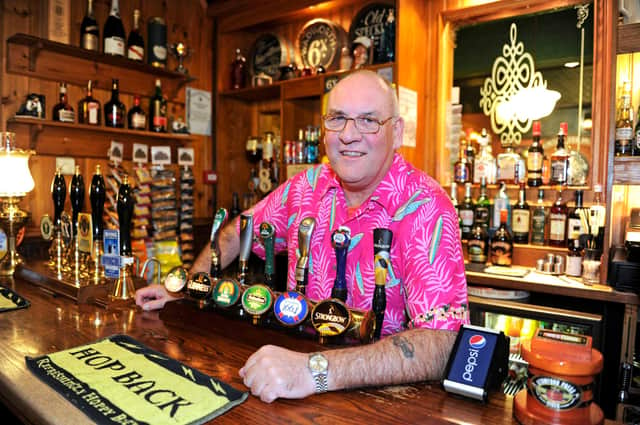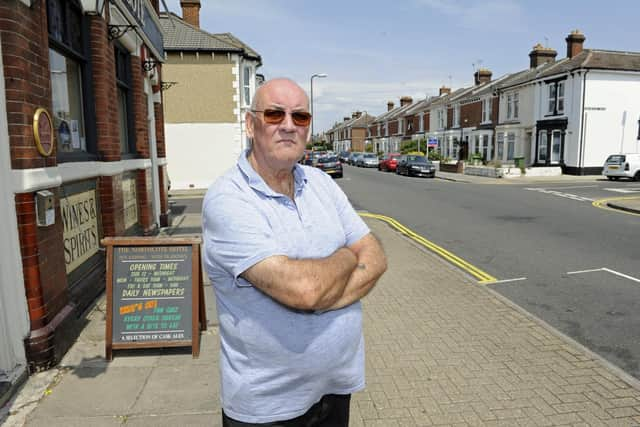Portsmouth landlord says Licensing Act changes are unnecessary


It said the consideration of these matters would allow local authorities to make decisions that better promote the key aims of the act - to improve community safety.
But the suggestion has prompted criticism from within the hospitality industry which said that extra red tape was 'the last thing our sector needs'.
Advertisement
Hide AdAdvertisement
Hide AdThe Local Government Association's proposal is for the Licensing Act to be updated to include a public health objective and allow for councils to take action where premises fail to protect the health of their communities.


At the same time, it has called for councils to be given greater access to NHS data, including the figures for hospital admissions and ambulance call-out data to guide decisions.
It said excessive alcohol consumption cost the NHS an estimated £3.2 billion a year on top of additional costs falling on other public bodies, including social services and the police.
But it said that despite their being an 'established link' between the consumption and availability of alcohol, councils were finding it 'challenging' to amend licences to take these matters into account.
Advertisement
Hide AdAdvertisement
Hide AdIt added that this provision would also give councils powers to implement measures in a future pandemic.
“The last year has shown us the importance of businesses taking measures to protect public health, yet currently councils are specifically discouraged from using the Licensing Act to consider public health issues,' councillor Nesil Caliskan, the chairman of its Safer and Stronger Communities Board, said.
'Councils want to support businesses and enable them to be successful but they also have a duty to protect their communities from infection and ill-health.
'New licensing powers to protect and improve public health would allow councils to fully take into account the social and health impacts on their local communities as well as help reduce NHS costs.
Advertisement
Hide AdAdvertisement
Hide Ad'Councils do not want powers to refuse every application. But being able to consider the public health impact of new licensed premises would allow them to take a more balanced view in line with their other priorities such as creating vibrant and safe town centres and protecting people from harm.'
She added that the new, stronger act would place a legal requirement on businesses to consider health issues while also strengthening the ability of councils to deal with related issues in their area.
Last year, the association issued new guidance in a bid to help councils consider ways through which these issues could be taken into account.
It added that while health bodies can make representations during the licensing process, issues they raised can only be considered if they meet the strict criteria under the act, limiting local authorities' power to take action when concerns are raised.
Advertisement
Hide AdAdvertisement
Hide AdAnd now it is calling for new powers to be written into law.
However, the suggestion has been met with resistance by the hospitality industry which has opposed the implementation of extra red tape on a sector which is just starting to recover from the effects of the pandemic.
Barry Kewell, the owner of the Northcote pub in Southsea and the chairman of Albert Road Pub Watch, said it was right that there were licensing checks on businesses but said it would be hard to monitor who's responsible for issues with pubgoers having become much more 'transient' in recent years.
'Things have changed a lot since I first got involved in the trade,' he said. 'People have a lot more choice in terms of what they drink and there's also much stronger drinks available these days. They also tend to go to more than one pub.
Advertisement
Hide AdAdvertisement
Hide Ad'I absolutely agree that we need to have some kind of system of checks in place because there are a very small number of bad businesses but most are perfectly happy working with the council and police to deal with issues.
'It's been a very hard year and a half or so for everyone, I think for now the process we have in place is working well and doesn't need to be changed.'
But the British Beer and Pub Association has gone a step further, urging the government not to consider the proposal, saying the move would be harmful to the industry.
'Pubs are still in the very early days of any recovery after the devastation caused by the pandemic and the last thing our sector needs is more red tape,' a spokesman for the organisation said.
Advertisement
Hide AdAdvertisement
Hide Ad'There is already a review process for any breaches of the Licensing Act and pubs take their responsibilities incredibly seriously as the home of safe and responsible drinking.
'In the absence of any clear evidence of a need for this extra measure we would strongly urge the government not to consider making such a fundamental change to the Licensing Act at this point.'
This call is not the first time the issue has been put into the public eye. In 2017, Public Health England published findings into a review of its own which found new licensing rules could play a 'positive role'.
----------------------
Under the Licensing Act, councils make licensing decisions based on four objectives.
Advertisement
Hide AdAdvertisement
Hide AdBasing decisions on these categories, licensing officers and members of council licensing committees can determine whether to grant new licences or revoke existing ones when it felt they are not being met.
The criteria are:
Public safety
This section focuses on the physical safety of both customers of and people working at a business.
Risk assessments are submitted as part of the licensing process outlining how businesses will meet this, including the management of queues and fire exits.
Capacity limits and safety checks can be enforced by councils to meet any potential concerns.
Prevention of public nuisance
Advertisement
Hide AdAdvertisement
Hide AdThrough this, public bodies are required to consider the effect a business' activities can have on people living and working in its vicinity.
It includes both large-scale and smaller issues of noise, smell, litter and light pollution.
To meet the objective, councils will often add conditions to licences such as opening hours, the requirement for noise-limiting equipment to be installed and the location of bins.
Protection of children from harm
This objective is focused on 'the protection of children from moral,psychological and physical harm'.
Advertisement
Hide AdAdvertisement
Hide AdThis includes not only preventing the underage consumption of alcohol but also the exposure of youngsters to inappropriate language.
To meet this, councils can enforce limits on the hours in which children can be allowed into a business or blanket age restrictions.
Prevention of crime and disorder
The act says councils should lean on police advice when considering the implications of any licensing decision on this objective.
It also guides them towards the use of the Security Industry Authority, through which approved companies can be used to employ door supervisors to prevent and manage these issues.
Conditions councils can apply should focus on deterrence and include the requirement to install CCTV systems.